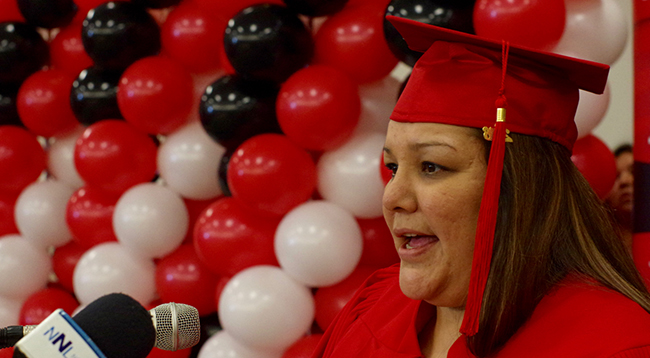Kiikenomaga Kikenjigewen Employment and Training sees new grads

By Rick Garrick
Long Lake #58’s Carolyn Hardy plans to study at Confederation College after graduating from Kiikenomaga Kikenjigewen Employment and Training Services Aboriginal Skills Advancement Program.
“I enjoy cooking so I’m going into the Culinary Management program and the Business Management program,” Hardy says. “My goal is to open my own restaurant … downtown in Thunder Bay.”
Hardy received her Ontario Secondary School Diploma along with 68 other graduates during the March 3 graduation ceremony, which was held at the Davinci Centre in Thunder Bay.
“It’s an awesome feeling,” Hardy says. “This was my number one goal and I’m so proud of myself to have achieved the number one goal I had in my life.”
Hardy delivered one of the two valedictorian speeches during the graduation ceremony.
“The friendships we have made here will last a lifetime,” Hardy says. “We have supported each other and helped each other to succeed in these past months at KKETS. I hope you will continue to provide support and encouragement for each other in future achievements.”
Hardy says the KKETS students didn’t have to look far for inspiration during their education journey at KKETS.
“We each had the potential to make an inspiring contribution to others by being true to our values and committing ourselves to our … goal,” Hardy says.
Hardy and many of the graduates took advantage of their opportunities at KKETS by completing their post-secondary entrance requirements during the program.
“It took me three-to-four months to get in,” Hardy says. “I started in May and I was (finished) by October. And then I took a couple of more courses until December for my college courses.”
Hardy emphasizes that she focused on her classes during the KKETS program.
“All I did was come home after school (and) study,” Hardy says. “(My partner) used to look at me wondering why I was studying so much. This is why, because I got my (OSSD). Also I’m valedictorian now.”
Long Lake #58 Chief Veronica Waboose encouraged the graduates to continue on their education journey.
“This is just a stopping place,” Waboose says. “They have to continue on in order to bring our people up. We need doctors, nurses, lawyers. We have to aim high.”
Waboose also encouraged community members to support those on their education journeys.
“That is the way the world is going,” Waboose says. “We have to keep up with the world.”
The ASAP program is part of Phase 2 of the KKETS training model, which is designed to prepare Matawa First Nations citizens to move forward with further employment and training opportunities to meet potential labour demands in the Ring of Fire mineral exploration area.
The pilot program had 62 graduates in 2012-13 and the 2014-15 program had 64 graduates. This year’s program was the first year of a three-year agreement with Ministry of Training of Colleges and Universities.
“If we keep on going, just think of how great our people are going to be with all of this education,” Waboose says.
“Go for it — go get your education and be something. And bring it back to the community. We need that help in the community.”

